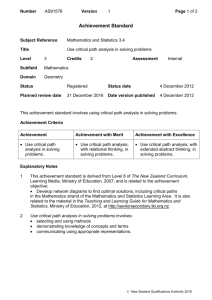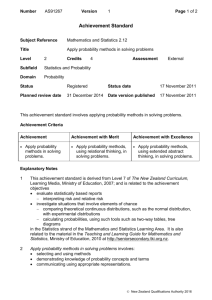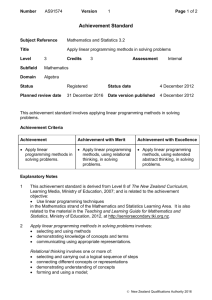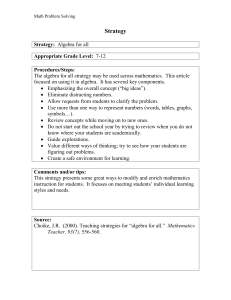Achievement Standard
advertisement
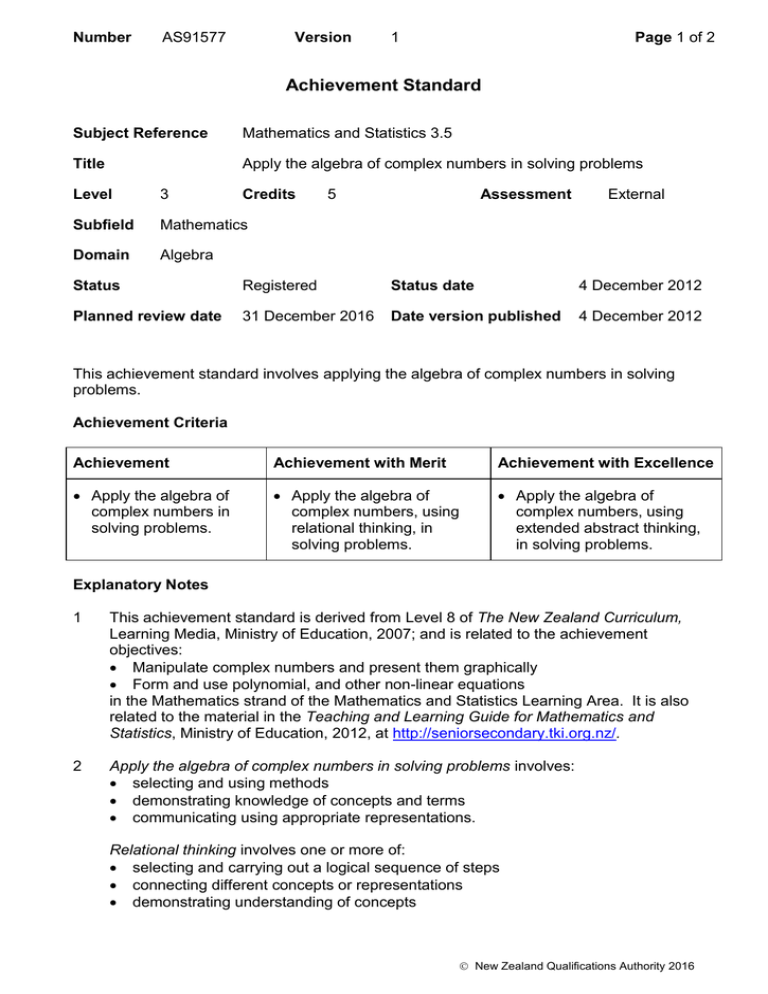
Number AS91577 Version 1 Page 1 of 2 Achievement Standard Subject Reference Mathematics and Statistics 3.5 Title Apply the algebra of complex numbers in solving problems Level 3 Credits Subfield Mathematics Domain Algebra 5 Assessment External Status Registered Status date 4 December 2012 Planned review date 31 December 2016 Date version published 4 December 2012 This achievement standard involves applying the algebra of complex numbers in solving problems. Achievement Criteria Achievement Achievement with Merit Achievement with Excellence Apply the algebra of complex numbers in solving problems. Apply the algebra of complex numbers, using relational thinking, in solving problems. Apply the algebra of complex numbers, using extended abstract thinking, in solving problems. Explanatory Notes 1 This achievement standard is derived from Level 8 of The New Zealand Curriculum, Learning Media, Ministry of Education, 2007; and is related to the achievement objectives: Manipulate complex numbers and present them graphically Form and use polynomial, and other non-linear equations in the Mathematics strand of the Mathematics and Statistics Learning Area. It is also related to the material in the Teaching and Learning Guide for Mathematics and Statistics, Ministry of Education, 2012, at http://seniorsecondary.tki.org.nz/. 2 Apply the algebra of complex numbers in solving problems involves: selecting and using methods demonstrating knowledge of concepts and terms communicating using appropriate representations. Relational thinking involves one or more of: selecting and carrying out a logical sequence of steps connecting different concepts or representations demonstrating understanding of concepts New Zealand Qualifications Authority 2016 Number AS91577 Version 1 Page 2 of 2 forming and using a model; and also relating findings to a context, or communicating thinking using appropriate mathematical statements. Extended abstract thinking involves one or more of: devising a strategy to investigate or solve a problem identifying relevant concepts in context developing a chain of logical reasoning, or proof forming a generalisation; and also using correct mathematical statements, or communicating mathematical insight. 3 Problems are situations that provide opportunities to apply knowledge or understanding of mathematical concepts and methods. Situations will be set in reallife or mathematical contexts. 4 Methods are selected from those related to: quadratic and cubic equations with complex roots Argand diagrams polar and rectangular forms manipulation of surds manipulation of complex numbers loci De Moivre’s theorem equations of the form zn = r cis , or zn = a + b i where a, b are real and n is a positive integer. 5 Assessment Specifications for this achievement standard can be accessed through the Mathematics and Statistics Resources page found at http://www.nzqa.govt.nz/qualifications-standards/qualifications/ncea/subjects/. Replacement Information This achievement standard replaced unit standard 5267 and AS90638. Quality Assurance 1 Providers and Industry Training Organisations must have been granted consent to assess by NZQA before they can register credits from assessment against achievement standards. 2 Organisations with consent to assess and Industry Training Organisations assessing against achievement standards must engage with the moderation system that applies to those achievement standards. Consent and Moderation Requirements (CMR) reference 0233 New Zealand Qualifications Authority 2016
